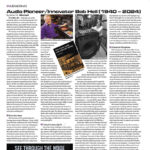Consider it the equivalent of hazing before getting into the fraternity of Front of House engineers–you're working with an opening band, and as you step up to mix a show, the main act's muckety-muck reaches over and turns down the entire P.A.
Welcome to the big time. Everything you'd hoped for, huh?
That situation has played itself out over decades of FOH history and new engineers accepted it both as a right of passage and brutal reality. The good news, according to Seether FOH mixer Howard Worthen, is that those days may be passing. "I've gotten the shaft pretty hard as far as them cutting me on volume and stuff. You don't see that a lot any more, and I think that comes from guys like me who started in the '80s going through that whole scenario," he says. "I know my point of view is that I've been through that and I would never do that to another person. "I don't want to be one of those guys, because I hated those guys," he continues, "and I don't want to be a dude that's hated. As of the last few years, you don't see a lot of that. You might get stuck with a console or some outboard that's not as good as the headliner, but for the most part, if you know what you're doing, you can make it work if they are giving you the P.A."
According to Big Mick Hughes, who has been on both sides of this topic while working with Metallica, there is a bevy of reasons for headlining engineers to keep an eye on an opener's mixer. One of the first, and perhaps most important, is the damage that a new-to-arenas mixer could do to the P.A while attempting to create the same sound pressure that can be found in clubs. "If you look at the ratio of P.A. to environment in a club, normally, you have such a massive ratio of sound system to the size of the venue," Big Mick reports. "Where as when you go into much larger venues, you haven't got that amount of P.A. to where you can saturate the arena to the same amount of pressure that you would do in a club.
"It's more of a concern of the system than anything, from my point of view. I'm concerned that somebody's going to come along and try to get something out of the P.A. that's not possible. Then it breaks, which I have to obviously deal with after they've broken it," he continues with a laugh. "I've had situations where bands that have been on prior to Metallica have actually gone and destroyed a large portion of the sub bass. I'm not going to say who it was and what band it was, but it was a drastic loss and I was gobsmacked when I got up there. When I checked the kick drum, it wasn't there. We went and had a quick look and the cabinet was ripped to bits. So, that's the danger you run."
At the same time, Big Mick says that most of the time, he gives any opening FOH mixer the option of using the system full-on, with an important caveat. "I ask them not to be as loud as Metallica," he admits. "If people have been in an arena for X amount of hours listening to opening acts, when Metallica goes on, I want there to be a discernable change.
"I think there are a lot of people who will just turn the system down straight off the bat, to be honest with you," he adds. "There is that side of it. They're either nervous of their own position with their act, or that's just something that they've done for years. It's not very fair really, because all it basically means is that the guy runs his gains higher and his gain structure drives harder into drive rack. I don't do that because you might as well let them have at it at first and see how they are going to do. If they go at it like demons, then of course you're just not going to allow it. You can't allow it; it's threatening the system and it's taking away from the impact of the main band as well. There has to be some common sense about."
From Worthen's seat, it doesn't matter how loud the supporting bands get during a tour. "We just came off a headlining tour with Crossfade and Dark New Day opening. I was like, 'Okay, I mix here. If you guys want to be louder, I don't care. Just don't blow anything up,'" he says.
That said, he has seen situations where an opening band is trying to blow the headliner off the stage by volume alone. "You walk in, and all you see are red lights all over the place. It's like, 'You don't have to do that. Think about how that sounds. Back it off a little bit and everything is going to spread out.' There are a lot of younger guys out there and they know how to mix a little bit, but all they are thinking is volume, volume, volume instead of separation and a nice mix. The volume has to be there because it's rock. You have to have some punch and some crunchy guitars, but it doesn't have to be parting your hair."
Worthen, who won't name names, reported a situation during the early '90s where he was cut 10dB a night by the main act's mixer, but he found a way around it. "As soon as you hear that kick drum, you know that that's as loud as that kick drum is going to go, so you've got to mix everything around that and bring it down even a little bit more so the vocals will ride right on top of it," he explains. "As much as I love instrumentals and doing a heavy rock mix, the vocals are the most important thing. If the audience can't hear the vocals, that's the first thing they complain about. So, that's the main thing: If you're getting screwed all the way around, get those vocals where you can hear them and do the best you can with the rest."
Compression has helped him achieve that. "I will over-compress stuff, and that way, everything is perfectly even," Worthen adds. "You can compress everything about 5 or 6dB, keep it nice and even, maybe not compress the vocals quite as much. I'll even do something, if I were getting screwed over, like compressing the entire instrument mix to where it's all riding at one level, and then compress the vocals to where they are riding at another level. That's a helpful little hint: Just put compression over the entire mix and then a different compressor just on the vocals."
While obvious, volume is a just one of the challenges an opening act engineer faces. Second-class gear, lack of space at the FOH position and minimal (sometimes, at best), sound check times are additional situations that these newer mixers have faced.
When Christian Seger was working with up-and-coming country singer Pat Green (he's since been replaced by Sean Murray) he was crammed in between the stations that the FOH teams of headliner Kenny Chesney and second act Gretchen Wilson had set up with a Yamaha DM-2000 console. While not as powerful, the DM-2000 was perfect for the gig. "I love that board," he says. "The footprint has been crucial at times when we've been squeezed in to Front of House positions where even a slightly larger desk wouldn't have worked. It's been on elevators, up stairs, in pickup trucks, you name it. Sonically, I've put down some of the best mixes that I've ever been responsible for out of that desk."
Worthen had a PM5D at his disposal while Seether was supporting Audioslave (which was using a Midas XL4), although he's been thrown into the fire with a Yamaha 3500. Rather than fighting it, he's found that rolling with it has served him better. "I never get too wound up about anything. I'm very laid back and I just kind of roll with what they give me. I don't complain, I just make it work, do the best I can and make it happen. That's all you can do," he says with a shrug of his shoulders.
Coheed and Cambria FOH mixer Pete Robertson reports that getting over with less-than-ideal gear is a matter of looking at the venue and figuring out what can be sacrificed that night. "For example, if it's a smaller room, maybe you don't need to have an overhead mic on the drums," he starts. "Our drummer, Josh Eppard, plays so loud that a lot of times in a small club, you hear the cymbals just fine, or they are being picked up by the vocal mic. "There are other areas that you can kind of cheat and get away with," he continues. "Having quality gear in the right places helps you out. With a good microphone selection, you can get by with one kick drum mic as opposed to two. You can get by with just a bass DI instead of a bass mic and a bass DI. A lot of bands out there now are double miking their guitar cabinets just to get a little wider spread."
So, lesser quality gear can be overcome. Good news. Lack of a sound check? That's a bit dodgier, and there isn't one working FOH mixer who hasn't scrambled through the first few songs to nail down the sound for the rest of the night.
Robertson's toughest gigs came when Coheed and Cambria were just starting out and on the road with fellow hardcore bands Thursday and Thrice. For the first two weeks of the tour, Thrice was getting used to a new personal monitor system and spent a lot of time sound checking. Robertson and the rest of the Coheed crew would just get the equipment set up when doors would open.
"Kids were running in the door and I still hadn't heard an instrument. Some of the clubs were very unsympathetic," he recalls with a laugh. "I would say, 'Look, I don't mind the kids being in here, but if you would just give me 10 minutes to go through and do a quick line check to make sure everything is working.' That was the first time that I had really run into that very rushed feeling." There were times it worked out, he allows, by the middle of the first song, but more often than not, it was the second or third.
For Seger, the only challenge he faced while working for Green on the Chesney tour was "the amount of time I am given to put my own thumbprint on the system, if you will, with regards to EQ or levels. There's just not enough time in the day," he says. "The system tech has been incredibly helpful and willing to do anything that I would want, but so far, we don't find the time for me to say, 'Oh, can we tweak this or that?' Simply because, by the time we're up and running, it's go time."
One of the keys for surviving a night without a sound check, Big Mick believes, is to trust the people who have set up the P.A. in the first place. "You do get some guys that are a little bit silly when they are backed up against the wall and the promoter is saying, 'OK, you've got an hour to get your shit together. Then the doors open.' They suddenly start saying, 'Well, I want to EQ the P.A.' and stuff instead of just going on with inputs and stuff," he says. "When they do that, it kind of casts aspersions on the capability of the person who EQ'ed it in the first place.
"That's normally myself or the systems engineer, who I trust as much as myself doing it," he continues. "So, guys sometimes shoot themselves in the foot."
When it comes to surviving the pressure of working as an opening band FOH mixer, there are a number of tips that these professionals offer. None more important, though, than a touch of humility with a bit of Worthen's take-it-easy attitude.
"Prepare yourself to walk into a situation where the absolute best thing you can be is quick and friendly and out of the way," Seger says. "If you don't do your homework, you can end up on the wrong side of the guys that you need to help you along every day."
Big Mick is most impressed by new engineers who come in and ask questions. "There is no shame in coming up and saying, 'I haven't done a show of this size before. What do you think I should know?' People don't sneer at you because that's the situation," he reports. "I mean, for some reason, it's a bit of a testosterone-driven thing. We all learned at some point. I learned an awful lot of stuff when we supported with Ozzy for many months. We all learn off of each other, but you've got to be willing to listen."



